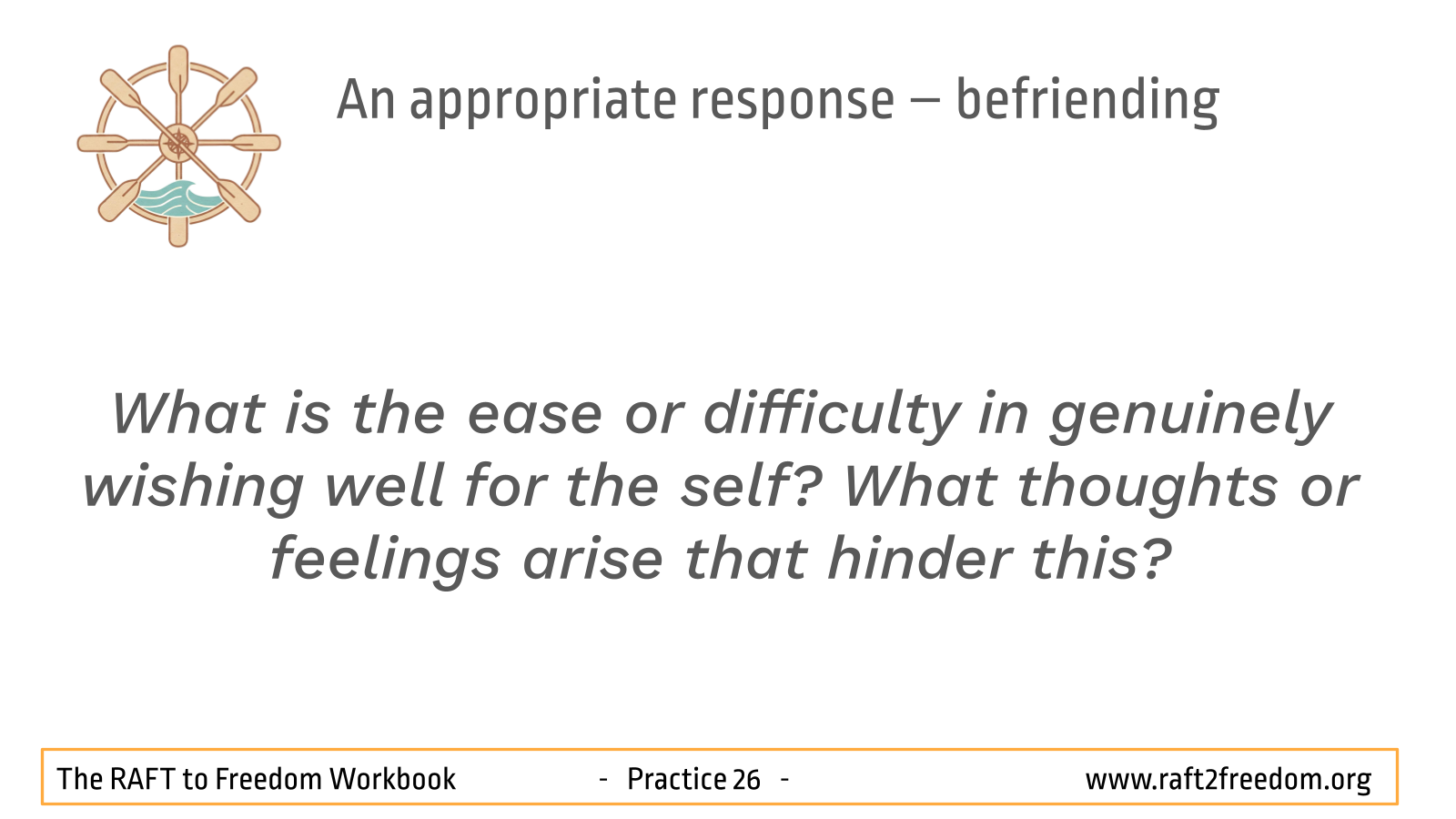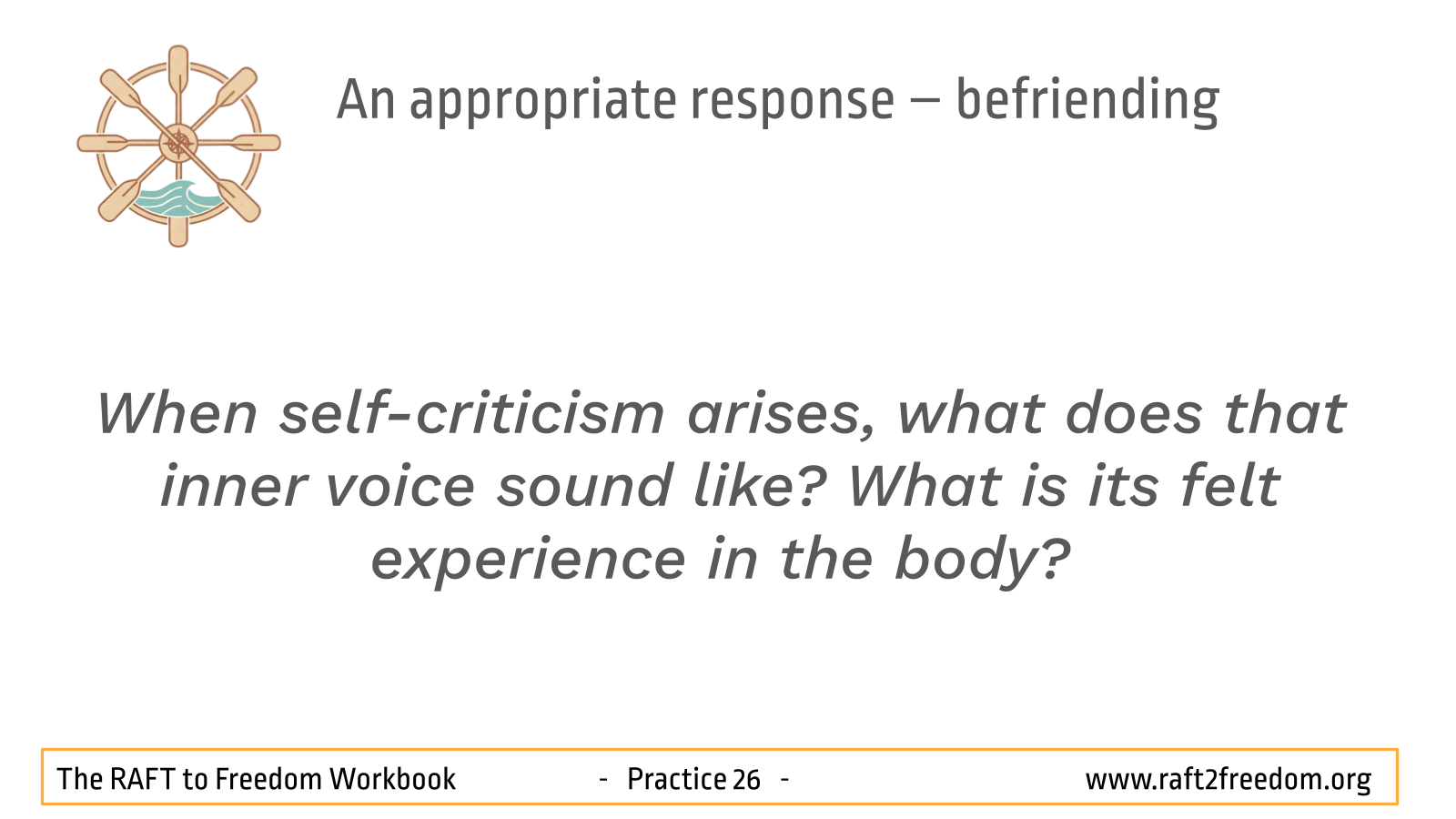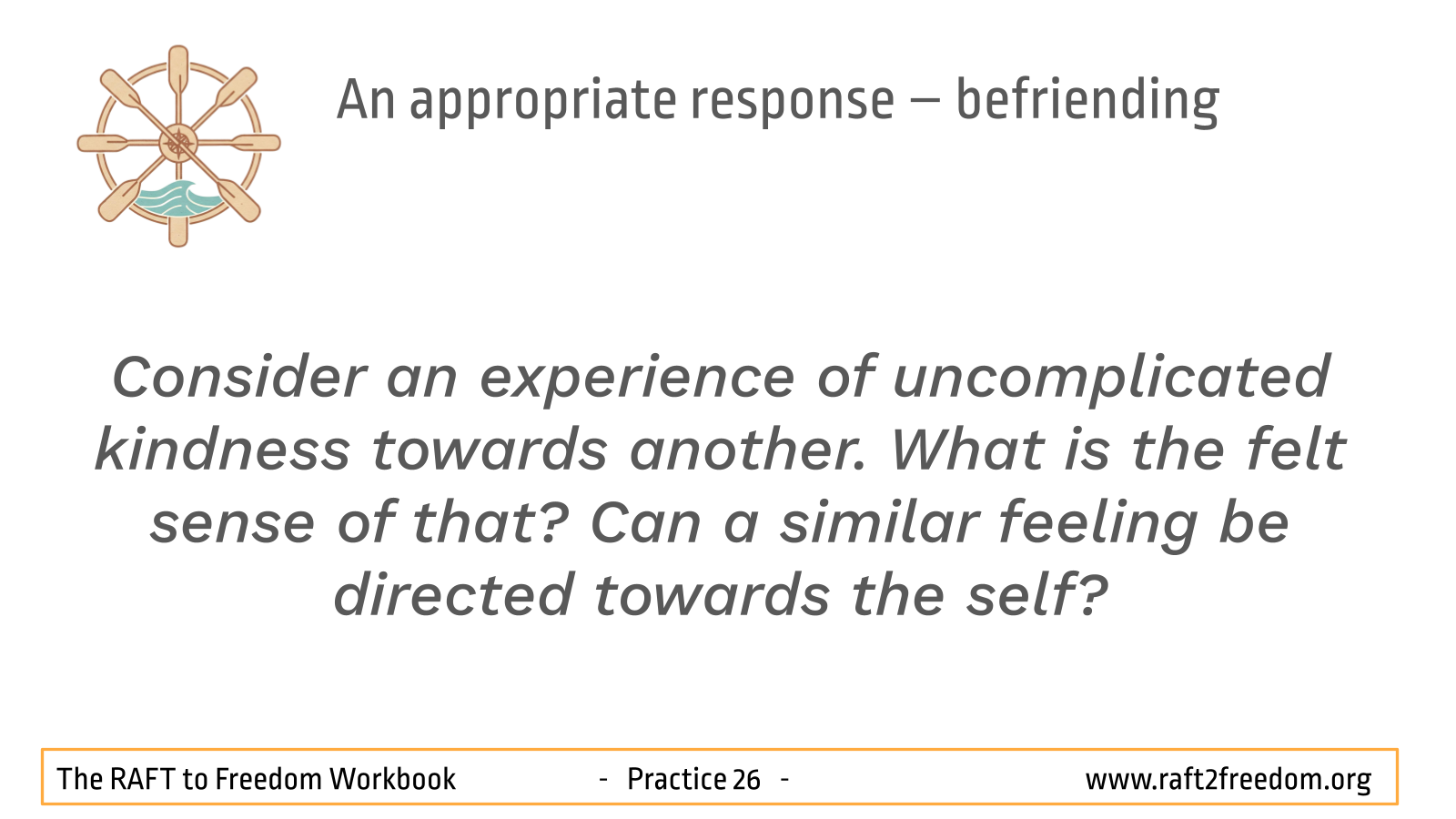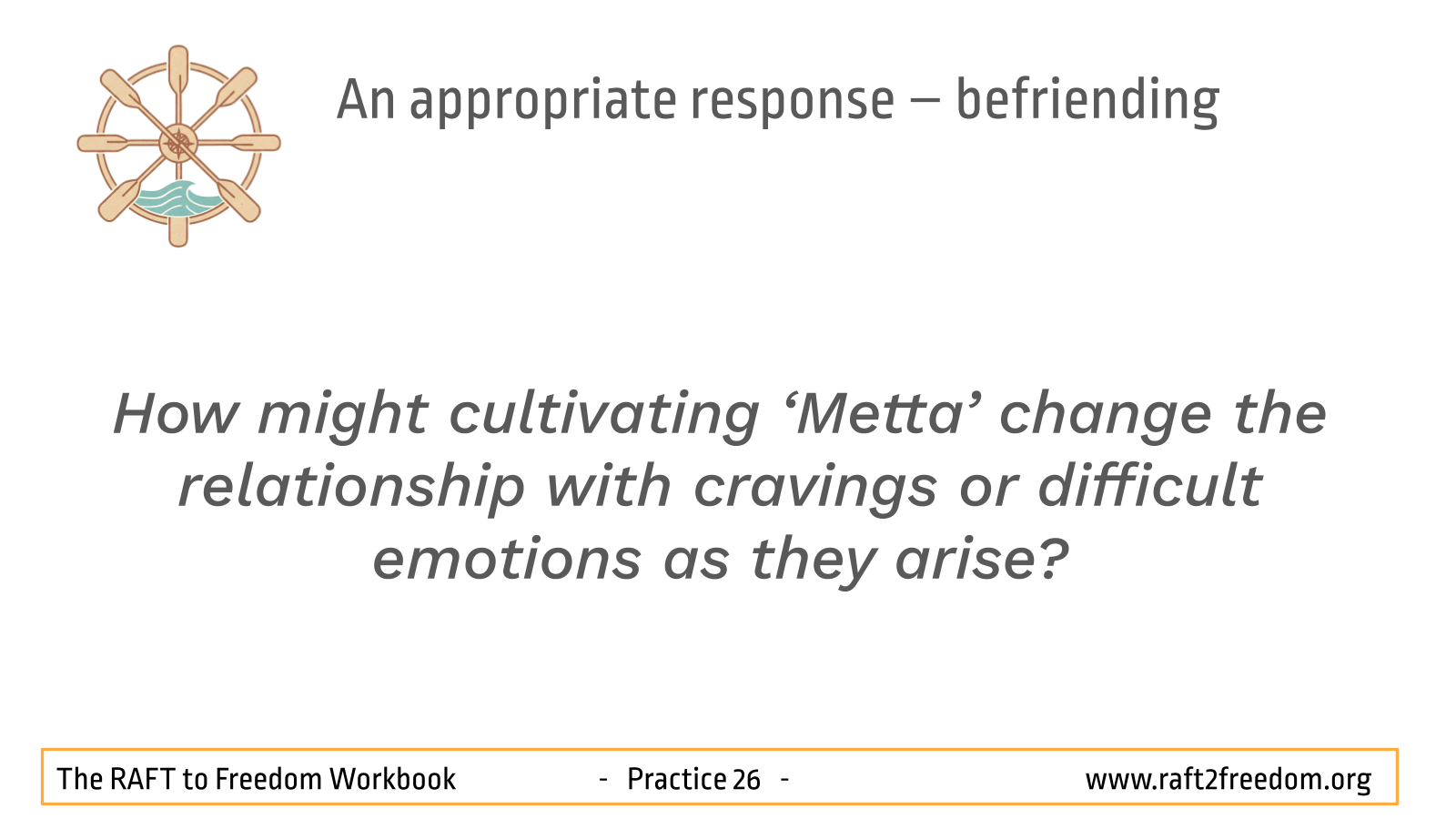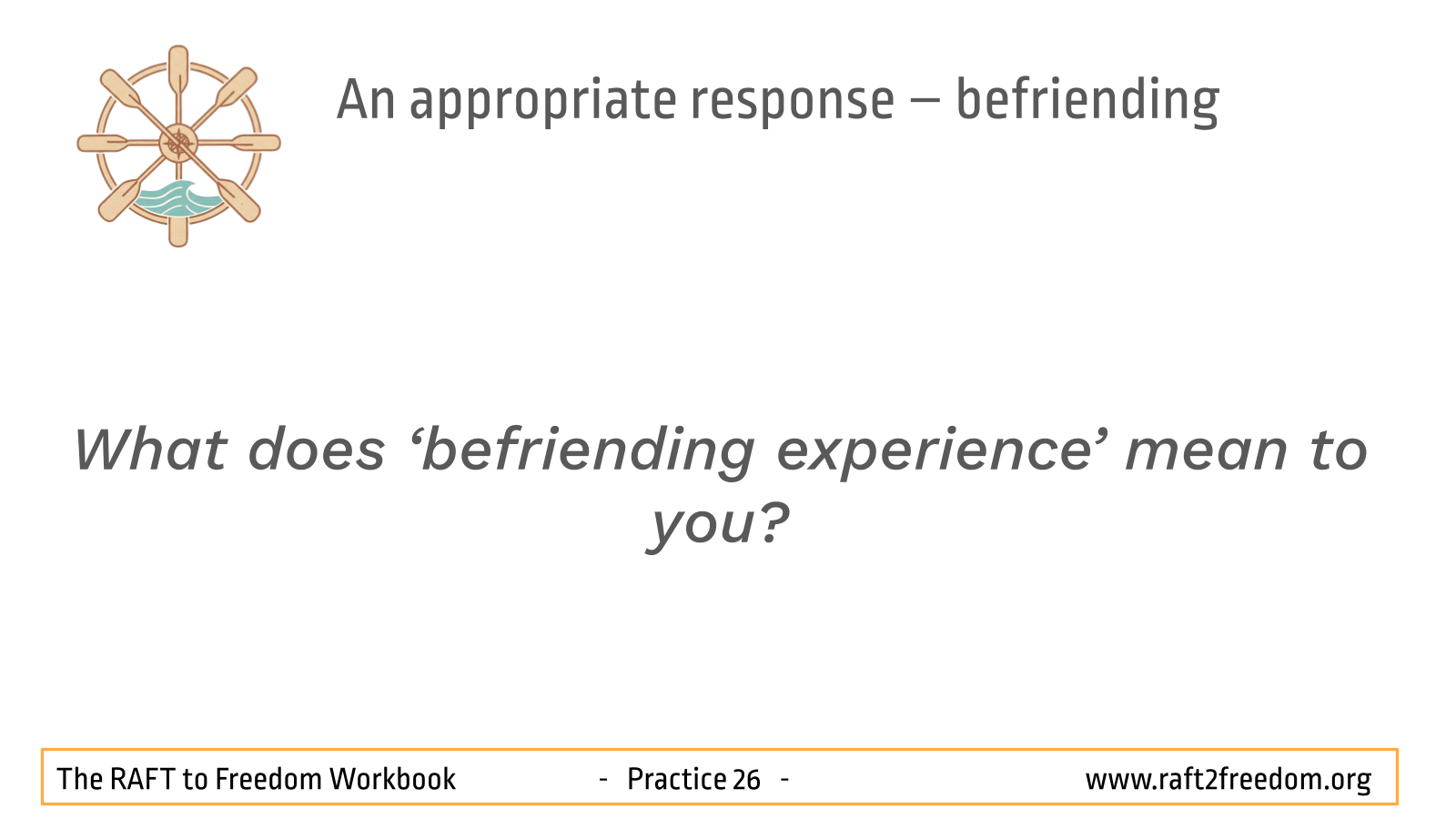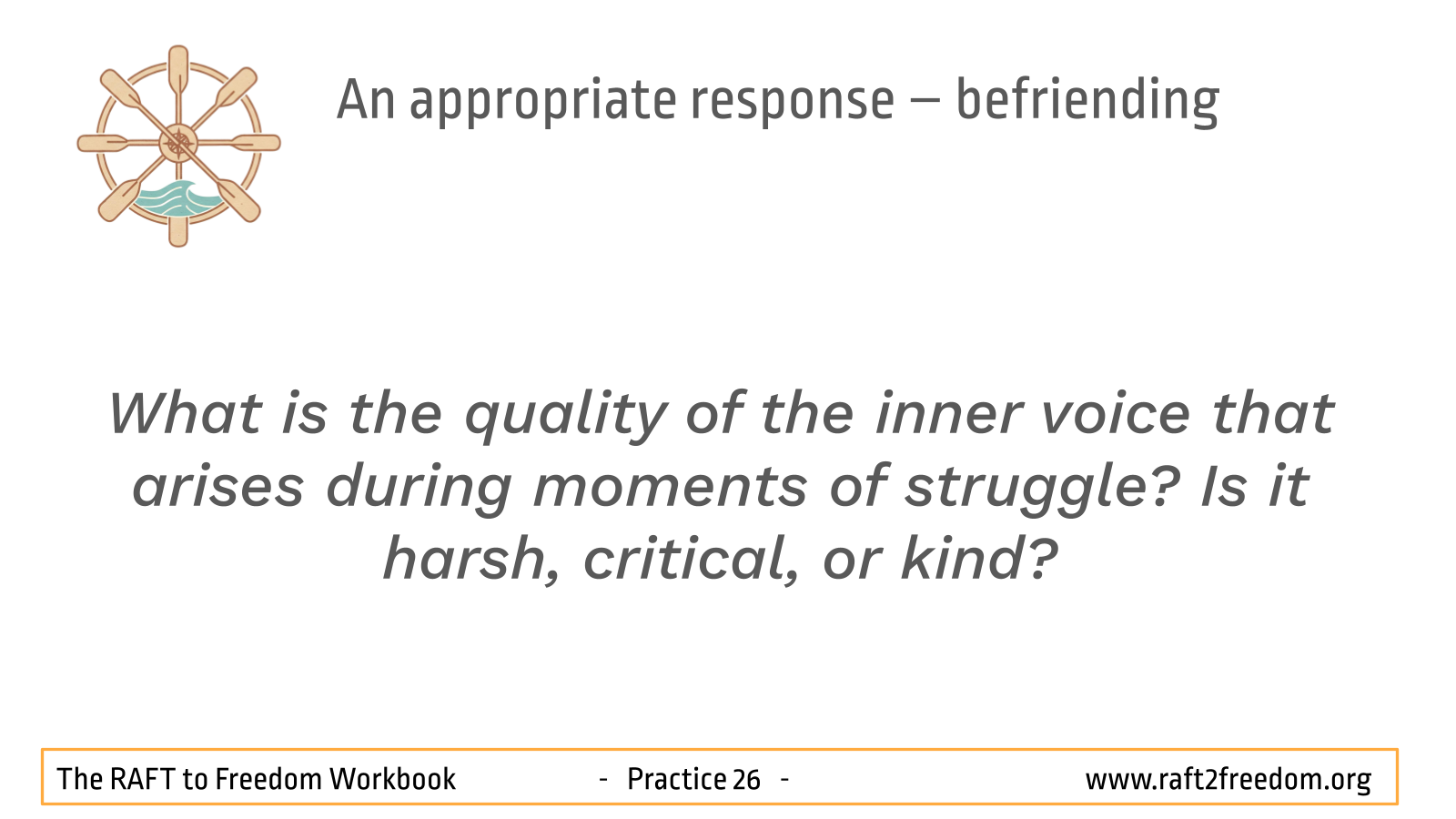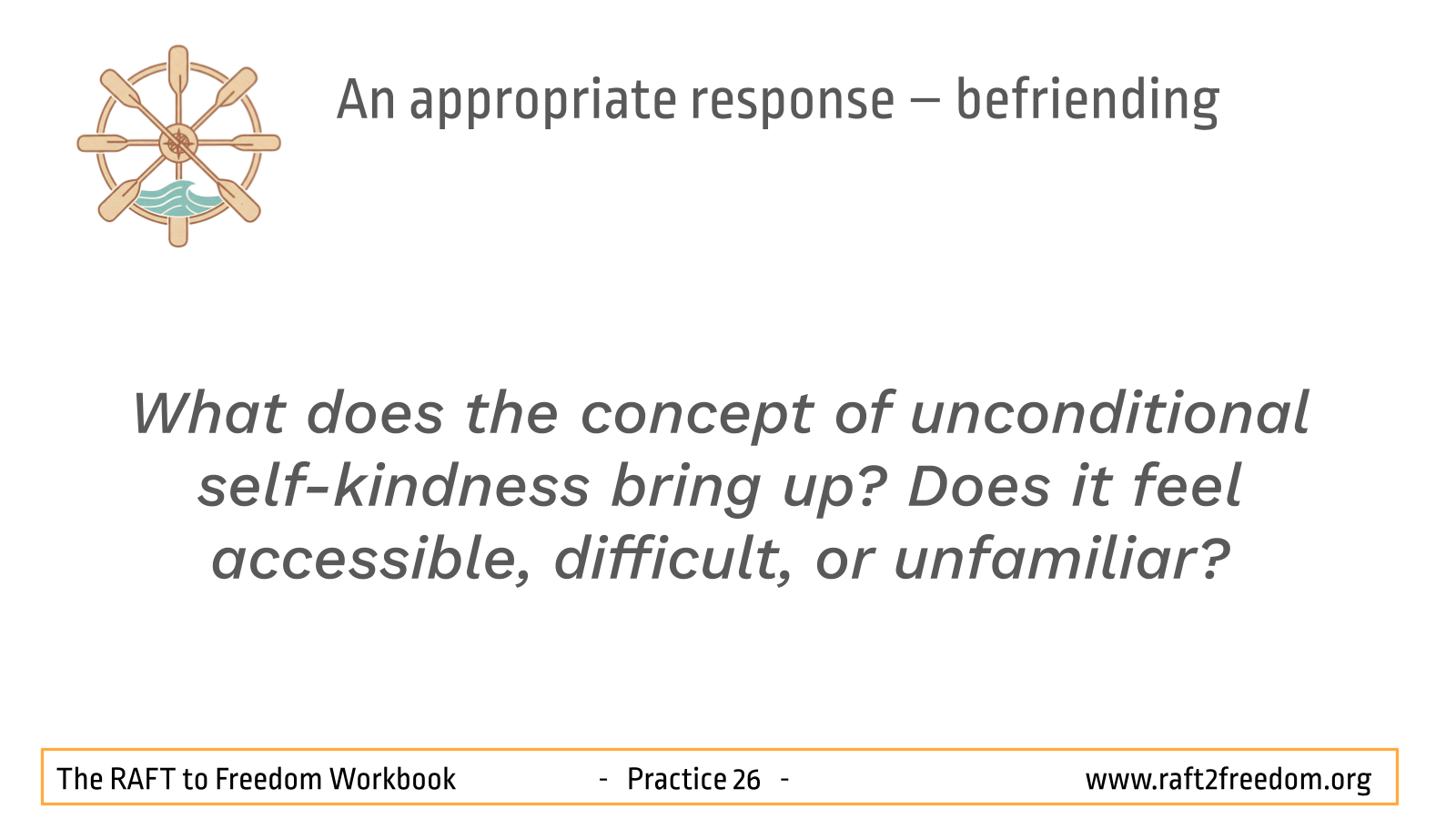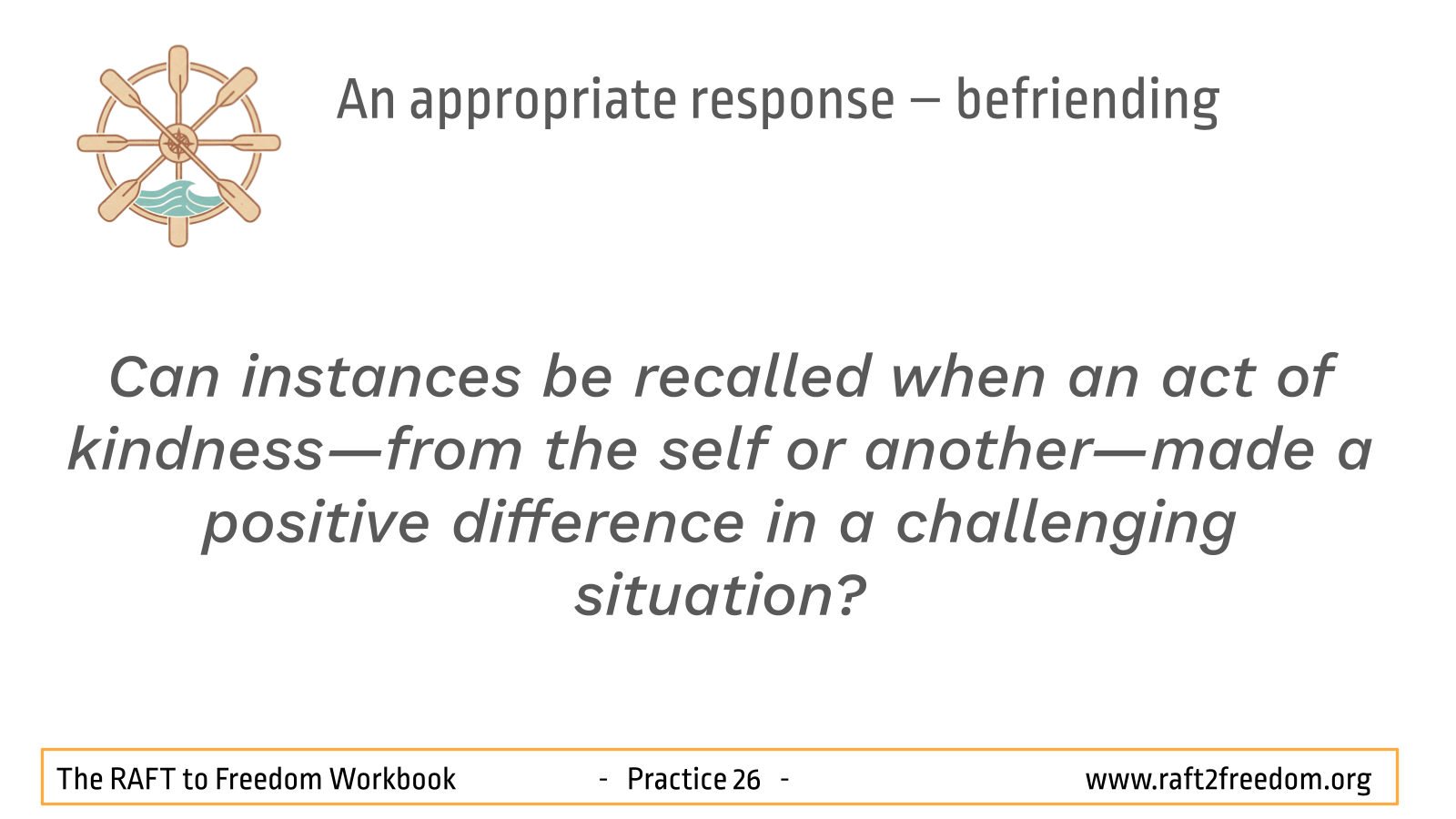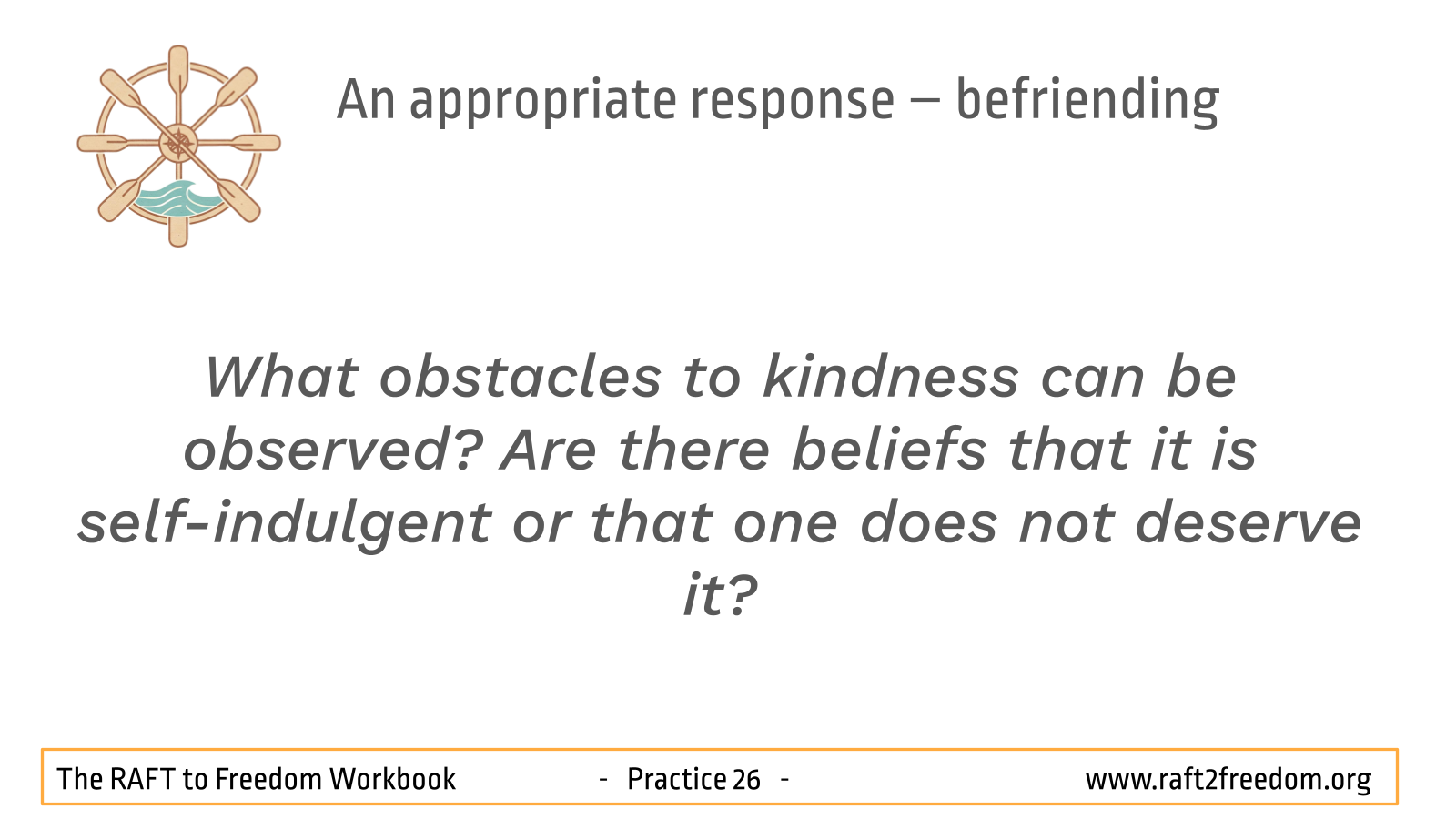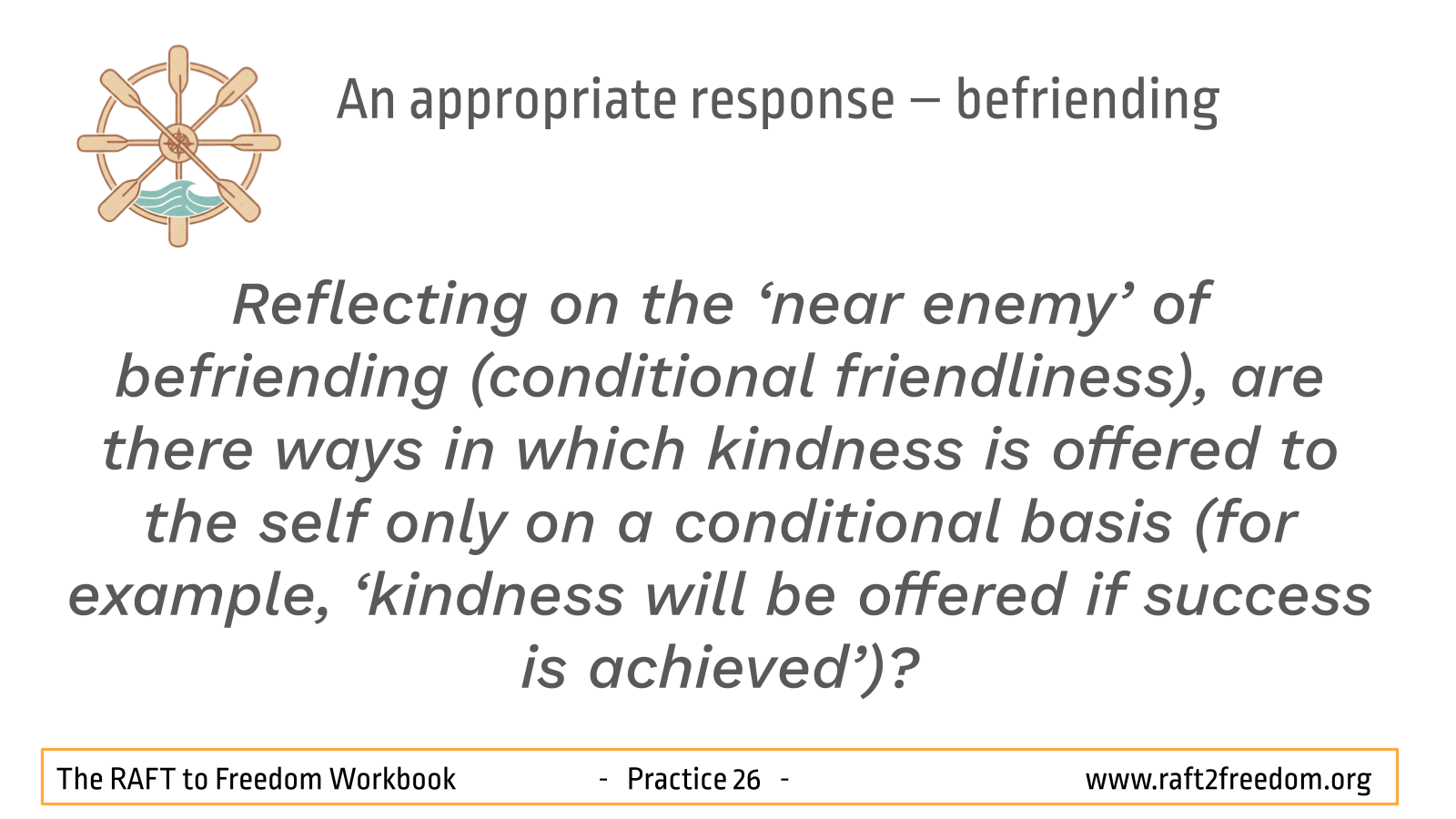Practice 26 – The Heart Practice – Befriending
The power of friendliness
You can search throughout the entire universe for someone who is more deserving of your love and affection than you are yourself, and that person is not to be found anywhere. You yourself, as much as anybody in the entire universe, deserve your love and affection.
attributed to Sharon Salzberg
Kindness is not a passive sentimentality, but an active, courageous, and unconditional friendliness that is the foundation of our path to freedom.
Christina Feldman

Episode 26 – An appropriate response – befriending
An AI generated ‘deep dive’ into this aspect of the RAFT to Freedom
We continue to navigate this second part of our journey – to abandon harmful cravings and compulsions. Having identified that suffering naturally arises and that suffering intensifies through craving (tanha). We now turn to the ‘Appropriate Response’ needed to support us in letting go: Befriending (Metta), the Heart Practice which acts as a vital second rope, binding the newly acquired materials of our raft together.
Metta is the Pali word for friendliness, goodwill and benevolence, also widely translated as ‘loving kindness’. It is an active interest in the well-being and happiness of the self and all beings. It is a warm, open-hearted quality, cultivated intentionally, that wishes well without expectation of return. It is distinct from conditional affection or mere politeness; it is a boundless quality, ideally extended universally. For our purposes within this workbook, we have chosen to translate Metta as ‘Befriending’.
Why is ‘Befriending’ the appropriate response when dealing with powerful urges, ingrained patterns, and the discomfort of letting go? Because meeting these difficult inner states with harshness, aversion, self-criticism, or judgment often backfires! It tightens the knot of suffering, increases resistance, and can sometimes, even fuel the desire to escape back into old patterns of destructive behaviours that limit freedom. As the Buddhist teacher Christina Feldman suggests: “It is always easier to hate and blame than to understand and embrace the difficult and painful“. Befriending offers an alternative way by embracing difficulty with kindness.
Traditionally each of the four ‘Heart Practices’ has a near and a far enemy. The far enemy of befriending is easily recognisable as hatred or ill-will. However, a more subtle challenge is the near enemy of kindness which is affection that is conditional or selfish attachment. This is a form of kindness or befriending that comes with an agenda; because it is only offered when things are going well or when we expect a certain outcome. True befriending is unconditional; it does not depend on our being perfect or successful. It is a steady, open-hearted friendliness toward our experience, exactly as it is.
Crucially for our journey to freedom, befriending must start by being directed inwards. The human struggle with craving and avoidance often breeds self-loathing, harsh self-judgment, and shame. Befriending practice directly counters this by inviting us to befriend our ‘self’, exactly as it is in this moment, with all of its struggles and imperfections. Gotama (the Buddha) emphasised that we will not find anyone more deserving of loving-kindness than ‘ourselves’. Cultivating self-kindness builds the inner resilience, acceptance, and kindness needed to face the often painful process of abandoning harmful habits, without collapsing into self-recrimination.
“Searching all directions with your awareness,
you find no one dearer than yourself.
In the same way, others are thickly dear to themselves.
So you shouldn’t hurt others if you love yourself.” ~ Gotama
In the second stage of our journey, this second rope of befriending and self-kindness, helps with the difficult work of patching the leaks (compulsions) and jettisoning the harmful cargo (cravings, attachments). Self-kindness softens the often harsh inner critic while providing the gentle lubrication needed to loosen the grip of harmful patterns, preventing further damage through self-aggression. Self-kindness keeps the heart open and resilient during struggles. It makes the often demanding work of abandoning sustainable. This practice is deeply connected to the ethical foundation of the ‘Five Gifts’. True kindness cannot coexist with the intention to harm. By cultivating an attitude of befriending toward the self, the commitment to harmlessness in thought, word, and deed is naturally strengthened. It is an active expression of care that stabilises the mind and in doing so, stabilises the raft for the journey ahead.
Gotama’s words on friendliness
In Gotama’s famous advice on befriending (‘Karaniya Metta Sutta’), this is what he says should be done:
“Someone who wants to attain peace should practice being upright, humble, and capable of using loving speech. They will know how to live simply and happily, with senses calmed, without being covetous and carried away by the emotions of the majority. Let them not do anything that will be disapproved of by the wise ones.
“And this is what they contemplate:
“May everyone be happy and safe, and may all hearts be filled with joy.
“May all beings live in security and in peace – beings who are frail or strong, tall or short, big or small, invisible or visible, near or faraway, already born, or yet to be born. May all of them dwell in perfect tranquility.
“Let no one do harm to anyone. Let no one put the life of anyone in danger. Let no one, out of anger or ill will, wish anyone any harm.
“Just as a mother loves and protects her only child at the risk of her own life, cultivate boundless love to offer to all living beings in the entire cosmos.
“Let our boundless love pervade the whole universe, above, below, and across. Our love will know no obstacles. Our heart will be absolutely free from hatred and enmity. Whether standing or walking, sitting or lying, as long as we are awake, we should maintain this mindfulness of love in our own heart. This is the noblest way of living.”
The importance of this advice emphasised in that many different Buddhist traditions chant these verses. A beautiful example of this chant is available here.
Gotama’s words in practice:
- Cultivate qualities: He invites us to cultivate skilful qualities: to be capable without arrogance, upright in conduct, and honest in speech; to be gentle and humble; content with little and easy to support; not overly busy or distracted; simple in our habits, restrained in the senses, prudent in judgment, and unfailingly courteous in our dealings with others.
- Universal goodwill: From this grounding, he asks us to train the heart in universal goodwill. We deliberately form the wish, ‘May all be well, happy, and peaceful,’ and we extend it without exception – to the weak and the strong, the large and the small, those near and those far, those already born and those yet to be born. This is not mere sentiment; it is a disciplined widening of concern that dissolves the boundaries created by preference and fear.
- Non‑harming: Equally essential is non‑harming. We commit ourselves not to deceive or despise anyone, and not to wish harm upon another – even in thought. When impulses to belittle, compete, or retaliate arise, we notice them and lay them down. In this way, harmlessness becomes the measure of our speech, our actions, and our intentions.
- A boundless heart: As the practice matures, the heart becomes boundless. We learn to radiate friendliness ‘towards the entire world – above, below, and all across – unrestricted,’ with the steadiness and fierce care of a mother protecting her only child. The image points to a love that is unwavering yet ungrasping: a firm resolve to safeguard the welfare of all beings.
- Steady mindfulness: Finally, Gotama roots this teaching in mindfulness. We carry this noble way of living into every posture and circumstance – walking, standing, sitting, or lying down – maintaining awareness so that friendliness is not confined to a meditation period but becomes the tone of our attention throughout the day.
Practised together, these elements – cultivated qualities, universal goodwill, non‑harming, a boundless heart, and steady mindfulness – make befriending both an aspiration and a daily discipline. They show us how to live gently and courageously, for our own good and for the good of all.
Traditionally, these are some of the practical benefits of cultivating befriending:
- You fall asleep easily, wake easily, and enjoy pleasant dreams.
- You become dear to human and non‑human beings alike.
- You are protected by benevolent forces (devas).
- You remain unharmed by external dangers such as poisons, weapons, and fire.
- Your face becomes naturally radiant.
- Your mind grows serene and settles easily into concentration.
- At life’s end, you die unconfused and are reborn in a happy realm.
While some benefits relate to specific cultural beliefs, the core message is clear: cultivating friendliness leads to inner peace, harmonious relationships, mental clarity, and resilience.
How to practice befriending: cultivating kindness
Befriending is a quality actively cultivated, most commonly through the repetition of ‘Metta phrases’.
- Start with the self: This is often the most crucial (and sometimes most difficult) step. Find a quiet space and gently repeat phrases directed inwards, connecting with the intention behind the words. Examples include:
- “May I be safe [from all dangers outside and within myself].”
- “May I be well [free from all sickness and disease].”
- “May I be happy [and free from all distress].”
- “May I love myself just as I am right now.” / “May I accept myself just as I am.”
- “May I be kind to myself.”
Any phrases that resonate with you can be adapted and included.
- Extend to others: Once some warmth is established for the self, gradually extend the phrases to:
- A benefactor or respected person (perhaps a sponsor or mentor)
- A dear friend
- A neutral person
- A difficult person (this requires stability and should be approached cautiously)
- All beings universally
- Integrate into daily life: Use ‘Metta phrases’ silently before sleep, upon waking, before challenging situations, or whenever self-criticism arises. Practice ‘Metta’ through kind thoughts, words, and actions.
- Metta for difficulties: Specific phrases can help befriend challenges:
- “May I hold my struggles with gentleness and care.”
- “May I meet life’s difficulties with a kind and open heart.”
- “May it be accepted that suffering is a part of life, and may it be met with wisdom and compassion.”
- “May there be peace in the midst of resistance to this experience.”
- “May there be safety and well-being in the midst of uncertainty.”
- “May there be ease in the midst of discomfort, anxiety, pain.”
- “May there be kindness in the midst of all that is difficult.”
- “May stillness be found in the midst of chaos.”
- “May balance be found in the midst of challenge, struggle, despair, aversion.”
Self-reflections
Consider the experience with friendliness and kindness:
- What is the ease or difficulty in genuinely wishing well for the self? What thoughts or feelings arise that hinder this?
- When self-criticism arises, what does that inner voice sound like? What is its felt experience in the body?
- Consider an experience of uncomplicated kindness towards another. What is the felt sense of that? Can a similar feeling be directed towards the self?
- How might cultivating ‘Metta’ change the relationship with cravings or difficult emotions as they arise?
- What does ‘befriending experience’ mean to you?
- What is the quality of the inner voice that arises during moments of struggle? Is it harsh, critical, or kind?
- What does the concept of unconditional self-kindness bring up? Does it feel accessible, difficult, or unfamiliar?
- Can instances be recalled when an act of kindness—from the self or another—made a positive difference in a challenging situation?
- What obstacles to kindness can be observed? Are there beliefs that it is self-indulgent or that one does not deserve it?
- Reflecting on the ‘near enemy’ of befriending (conditional friendliness), are there ways in which kindness is offered to the self only on a conditional basis (for example, ‘kindness will be offered if success is achieved’)?
Journaling prompts
Explore the practice of befriending more deeply through journaling:
- Self-kindness practice: Commit to practicing ‘Metta phrases’ for the self for ten minutes daily for one week. Journal about the experience: What was the ease or difficulty? What feelings arose? Were any shifts noticed?
- Obstacles to self-kindness: Write honestly about beliefs or feelings that make it difficult to be kind to the self (for example, “I don’t deserve it,” “I am weak,” “I need to be hard on myself”). Gently question these beliefs.
- Extending befriending: Choose one category (benefactor, friend, neutral person, difficult person – starting where it feels manageable). Practice extending the ‘Befriending phrases’ to them in your mind for a few minutes. Journal about the experience.
- Kindness in action: Identify one small, concrete act of kindness that could be offered – either to the self (for example, taking a restful break, forgiving a small mistake) or to another – today. Plan and reflect on it afterwards.
- Universal friendliness: Reflect on the line from the ‘Karaniya Metta Sutta’ about radiating boundless friendliness “Above, below and all across.” What would be the felt sense of approaching the world, just for a few moments, with this attitude?
- Observing the inner critic: For one day, notice the arising of the inner critic. Instead of engaging with it, simply note its presence and its message. Later, write about this process of observation without judgment. What happens when the critical voice is not automatically believed? “I see you, Mara!”.
- Kindness versus other responses: Think of a recent challenging situation. What was the initial reaction? Was it kindness, or something else like anger, fear, or blame? Explore how that reaction affected the situation and overall well-being. How might responding with kindness have changed the experience?
- The rope metaphor: Reflect on how ‘Befriending’ can act as a ‘rope’ binding your raft. How might this quality provide strength and flexibility when facing challenges, preventing your raft from falling apart under the stress of craving or aversion?
- Observing the habitual responses: When a strong urge or a difficult emotion arises, what is the immediate, habitual response of the mind? Is it one of aversion and a desire to push away, or is there space for a different quality, like friendliness or curiosity?
- Conditional kindness versus unconditional kindness:Consider the distinction between conditional affection (the ‘near enemy’) and unconditional kindness. Can instances be recalled where kindness was offered to the self only when things were going well? What would it mean to offer friendliness even in moments of perceived failure or imperfection?
- Befriending experience: Reflect on the idea of befriending an experience, not just a person. What would it be like to meet a physical pain, a moment of anxiety, or an unwelcome thought with the same gentle intention offered in Metta practice? “Hello darkness, my old friend”.
- Body connection: Notice the connection between the body and the mind’s attitude. What physical sensations accompany a state of self-criticism or ill-will? Conversely, what subtle shifts in the body can be felt when a phrase of kindness is silently repeated?
Supporting material: scientific and philosophical perspectives
For those interested in the scientific and philosophical underpinnings of ‘universal friendliness’, the following overview highlights some key connections.
- Neuroscience: Loving-Kindness Meditation (LKM) and compassion practices have been shown to activate brain regions associated with positive emotions, empathy, social connection, and maternal bonding (for example, insula, anterior cingulate cortex, prefrontal cortex areas, potentially involving oxytocin release). Regular practice is linked to increased positive affect, reduced negative affect, enhanced emotional regulation, and potentially even positive effects on physical health markers like reduced stress hormones, improved immune response, and possibly longer telomeres (suggesting slower cellular ageing). The cultivation of kindness and compassion is associated with increased activity in brain regions linked to positive emotions, empathy, and emotional regulation, such as the left prefrontal cortex. Practices like these can strengthen neural pathways that support feelings of safety and social connection, while down-regulating the brain’s threat-response system (the amygdala). This shift helps to create a stable inner environment conducive to abandoning unskilful habits.
- Psychology: Dr. Kristin Neff’s work on self-compassion (treating the self with kindness, recognising common humanity, mindful acceptance of suffering) shows strong correlations with reduced depression, anxiety, and stress, and increased resilience and life satisfaction. Metta practice directly cultivates these qualities. Positive psychology emphasises the cultivation of positive emotions and character strengths like kindness for overall flourishing. Attachment theory suggests Metta can help develop a more secure internal attachment style. Modern therapeutic models increasingly incorporate such practices; for example, Compassion-Focused Therapy (CFT) directly uses kindness and compassion exercises to help regulate threat-based emotions like shame and self-criticism, which are often drivers of harmful compulsive behaviours. Acceptance and Commitment Therapy (ACT) encourages acting in line with core values; cultivating kindness as a value allows a compassionate response to difficulty, rather than automatically reacting based on uncomfortable feelings or urges.
- Philosophy: Ethics of Care emphasises relationality and compassionate response. Concepts of benevolence, altruism, and goodwill are central virtues in many ethical systems East and West. The Golden Rule (‘Do unto others…’) resonates with Metta’s outward extension. Philosophers have debated the relationship between self-love and love for others, with many traditions (including Buddhism) seeing healthy self-regard as a necessary foundation for genuine care for others. Buddhist philosophy views kindness not merely as a pleasant emotion but as a profound insight into the interconnected nature of all beings. It arises from the wisdom that understands that all beings, without exception, share the fundamental wish to be happy and free from suffering.
Remember to remember
Befriending (Metta) is the appropriate response and an essential heart practice for providing the warmth, acceptance, and resilience needed to undertake the challenging work of ‘Abandoning’ harmful craving and compulsions. It is the second vital rope that softens our approach, counters self-aggression, and makes the often-difficult process of letting go sustainable and ultimately healing. By consciously cultivating friendliness towards the self – its struggles, its setbacks, its inherent worthiness – and extending it outwards, an inner environment is created where harmful cravings have less power and wholesome states can flourish.
Remember Gotama’s words: the self is truly deserving of its own kindness. As we continue to gather the materials to build our raft, within the second stage of our journey, let self-kindness infuse our efforts. It is the gentle strength that holds our raft together as we navigate troubled waters towards the freedom of the safe shore. Having established this crucial heart quality – an appropriate response to abandoning harmful cravings and compulsions – we are better prepared to explore the specific tools and insights needed for this abandoning, beginning with ‘Mindfulness of feeling tones’.
RAFT to Freedom © 2025 by Dr Cathryn Jacob and Vince Cullen is licensed under CC BY-NC-SA 4.0. To view a copy of this license, visit https://creativecommons.org/licenses/by-nc-sa/4.0/ |
Kindness is the revolutionary act of treating ourselves and others with a tenderness that recognises the suffering inherent in the human condition.
Pema Chödrön
Three things in human life are important: the first is to be kind; the second is to be kind, and the third is to be kind.
Henry James
Sutta references
- Karaṇīya Mettā Sutta (Snp 1.8): The Discourse on Loving-Kindness
- Summary: This is Gotama’s primary discourse on Loving-Kindness. It outlines the qualities of a person who is skilled in goodness and describes how to cultivate boundless goodwill towards all beings, without exception, wishing for their safety and happiness. It serves as the foundational guide for this heart practice, showing Metta as the appropriate response to the suffering amplified by craving.
- Mettā Sutta (AN 11.16): Benefits of Loving-Kindness
- Summary: In this discourse, Gotama details eleven specific benefits of developing and pursuing the practice of loving-kindness. These benefits include sleeping and waking in comfort, having pleasant dreams, being dear to human and non-human beings, being protected by devas, and being led toward higher states of mind and rebirth. This demonstrates the profound positive impact Metta has on well-being, directly supporting the abandonment of harmful states.
- Vatthūpama Sutta (MN 7): The Simile of the Cloth
- Summary: In this teaching, Gotama explains that just as a dirty cloth cannot be properly dyed, a defiled mind cannot absorb the teachings. He lists mental impurities like ill-will and anger, and explains that cultivating the Four Brahma-Vihāras, including kindness (Mettā), is a primary method for cleansing the mind, making it bright, clear, and receptive to wisdom. This sutta highlights Metta’s role in purifying the mind, which is essential for abandoning craving and moving towards freedom.
- Brahma-vihara Suttas (e.g., AN 4.125, DN 13, MN 7): Divine Abodes
- Summary: These suttas describe Metta as the first of the four ‘Divine Abodes’ (Brahma-Vihāras). They explain the systematic cultivation of Metta, Compassion, Appreciative Joy, and Equanimity, extending them boundlessly. Metta is defined as pervading all directions with a heart imbued with loving-kindness, abundant, exalted, and immeasurable, free from hostility and ill will. This broad context reinforces Metta’s foundational role within a complete practice aimed at liberation from suffering.
